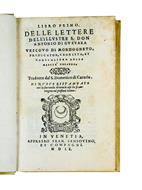Libro primo [-terzo] delle lettere [...] Tradotto dal S. Domenico di Catzelu
8vo. Three parts in two volumes. I: (8), 244 leaves. *8, A-Z8, Aa-Gg8; II: (8), 278 leaves. ab8, A-Z8, Aa-Ll8, Mm4; III: 72 leaves. A-I8. With the printer's device on the title-pages and at the end. 18th century vellum over boards, spines with morocco label and gilt lettering. Basso, p. 100; Edit 16, CNCE 22224, CNCE 22226, CNCE 22227; E. Bonora, Ricerche su Francesco Sansovino, (Venezia, 1994), p. 73. FIRST EDITION of the first three books of Guevara's letters published together. Giolito de' Ferrari was the first in Italy to publish the first two books of letters, as well as many other works by Guevara. But for the third book he was preceded by Vincenzo Valgrisi who in 1557 issued it in an Italian translation by Alfonso Ulloa, dedicated to Sforza Pallavicino. In 1559 Valgrisi republished the work with some additions and a new dedication to Isabella Gonzaga d'Avalos. Since the ten year privilege granted to Valgrisi had not yet expired in 1560 unlike that of Giolito, Francesco Sansovino issued the third book without dedication and without mentioning the name of Ulloa. For the text of the first two books, Sansovino used one of the many earlier editions by Giolito (for the letters of the first two books see in our stock Libro primo [-secondo], Venice, Giolito, 1555-1548). (Book III:) Manrique, Garcia (l. 2r) Lopez, Pedro (l. 10v) Vasquez, Gonzalo (l. 17v) Melendez, Francisco (l. 26r) Cobos, Francisco de. Valladolid, June 25, 1539 (l. 33v) Allons, Alvaro (l. 59v) Manrique, Iñigo de (l. 66r) Antonio de Guevara was the major prose writer of sixteenth century Spain. The enormous success of his works, made him the first Spanish writer to achieve a status comparable to that of the great authors of antiquity. He was born around 1481 in the city of Treceño and moved in 1492 to the royal court, where he stayed until the mid 1510s. Around 1506 he joined the Franciscan Order. In 1521 Charles V summoned him to serve as preacher in the royal chapel, a post that he occupied, however, only two years later. In 1525 and 1526 he was sent to Valencia and Granada as a commissioner of the Inquisition to evangelize the Islamic population. As a reward, the emperor appointed him royal chronicler. In 1528 Guevara wrote the Libro aureo de Marco Aurelio, followed a year later by the Libro llamado Relox de principes, a reworking of the previous book, both of which became two of the most frequently published works in Europe. In 1529 he was elected bishop of Guadix, and in 1537 bishop of Mondoñedo. Three years later, probably because he felt uncomfortable, he asked for a different position in Valladolid, which, however, was denied to him. His disappointment is clearly manifest in his last works, including the second book of letters, which became more spiritual and ascetic. He died in 1545, while he was finishing La segunda parte del libro llamado Monte Calvario. By that time he had gained international renown and his writing where widely read and imitated all over Europe (cf. E. Grey, Guevara, A forgotten Renaissance Author, The Hague, 1973 passim; see also J.R. Jones, Antonio de Guevara, Boston, 1975, passim; and A. Redondo, Antonio de Guevara (1480?-1545) et l'Espagne de son temps. De la carrière officielle aux oeuvres politico-morales, Genève, 1976, passim).
Venditore:

Informazioni:
<p>8vo. Three parts in two volumes. I: (8), 244 leaves. *<sup>8</sup>, A-Z<sup>8</sup>, Aa-Gg<sup>8</sup>; II: (8), 278 leaves. ab<sup>8</sup>, A-Z<sup>8</sup>, Aa-Ll<sup>8</sup>, Mm<sup>4</sup>; III: 72 leaves. A-I<sup>8</sup>. <em>With the printer's device on the title-pages and at the end</em>. 18<sup>th</sup> century vellum over boards, spines with morocco label and gilt lettering.</p> <p>Basso, p. 100; Edit 16, CNCE 22224, CNCE 22226, CNCE 22227; E. Bonora, <em>Ricerche su Francesco Sansovino</em>, (Venezia, 1994), p. 73.</p> <p>&nbsp;</p> <p>FIRST EDITION of the first three books of Guevara's letters published together. Giolito de' Ferrari was the first in Italy to publish the first two books of letters, as well as many other works by Guevara. But for the third book he was preceded by Vincenzo Valgrisi who in 1557 issued it in an Italian translation by Alfonso Ulloa, dedicated to Sforza Pallavicino. In 1559 Valgrisi republished the work with some additions and a new dedication to Isabella Gonzaga d'Avalos. Since the ten year privilege granted to Valgrisi had not yet expired in 1560 unlike that of Giolito, Francesco Sansovino issued the third book without dedication and without mentioning the name of Ulloa. For the text of the first two books, Sansovino used one of the many earlier editions by Giolito (for the letters of the first two books see in our stock <em>Libro primo</em> [-<em>secondo]</em>, Venice, Giolito, 1555-1548).</p> <p>(<em>Book III</em>:)</p> <p>Manrique, Garcia (l. 2r)</p> <p>Lopez, Pedro (l. 10v)</p> <p>Vasquez, Gonzalo (l. 17v)</p> <p>Melendez, Francisco (l. 26r)</p> <p>Cobos, Francisco de. Valladolid, June 25, 1539 (l. 33v)</p> <p>Allons, Alvaro (l.
Immagini:
![Libro primo [-terzo] delle lettere [...] Tradotto dal S. Domenico di Catzelu](https://www.lafeltrinelli.it/images/2570270091025_238441551_0_0_0_75.jpg)
-
Autore:
-
Editore:
-
Tipologia:
-
Copertina:rilegato
- Prodotto usato
- Condizioni: Usato - In buone condizioni
Le schede prodotto sono aggiornate in conformità al Regolamento UE 988/2023. Laddove ci fossero taluni dati non disponibili per ragioni indipendenti da Feltrinelli, vi informiamo che stiamo compiendo ogni ragionevole sforzo per inserirli. Vi invitiamo a controllare periodicamente il sito www.lafeltrinelli.it per eventuali novità e aggiornamenti.
Per le vendite di prodotti da terze parti, ciascun venditore si assume la piena e diretta responsabilità per la commercializzazione del prodotto e per la sua conformità al Regolamento UE 988/2023, nonché alle normative nazionali ed europee vigenti.
Per informazioni sulla sicurezza dei prodotti, contattare productsafety@feltrinelli.it
![Libro primo [-terzo] delle lettere [...] Tradotto dal S. Domenico di Catzelu - Antonio De Guevara - copertina](https://www.lafeltrinelli.it/images/2570270091025_0_0_536_0_75.jpg)

![Libro primo [-terzo] delle lettere [...] Tradotto dal S. Domenico di Catzelu - Antonio De Guevara - copertina](https://www.lafeltrinelli.it/images/2570270091025_0_0_424_0_75.jpg)
